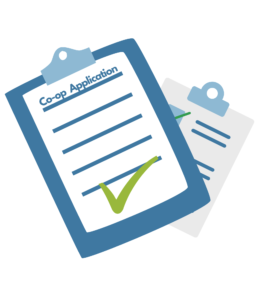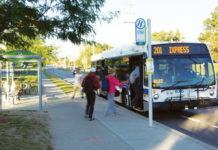For the first few months of every term, co-op applications are at the forefront of many students’ minds, and understandably so. The co-op structure at the University of Waterloo is time-consuming — students often apply to upwards of 50 jobs and sit through hours of interviews in search of a good co-op job. Especially in your first couple of years at the university, the application process can be overwhelming. It’s hard to master the different platforms and know how to present yourself in the best way possible.
But don’t stress too much yet. UW’s co-op employment statistics show that many students do not confirm their co-op job during the first two cycles, meaning you have time. Muhammad Abubaker, an upper-year AFM student, emphasized the importance of being confident. “Trust and believe in yourself,” he said. “Don’t compare yourself to others 24/7.”
Here is advice from people familiar with co-op at the University of Waterloo.
Put in the effort

Hard work is key to success in UW’s co-op system. For example, it’s important to write a unique cover letter for each job, rather than using the same one for multiple applications. While you can definitely have a standardized approach and copy sections between letters, employers will be able to tell if the application is generic and surface-level. It’s also helpful to participate in mock interviews or do other interview practice. During academic terms, especially before your first co-op placement, participating in extracurriculars and working on side projects related to your program or desired field can make your future applications stand out.
Most important, remember that there are many support options available to students. Take advantage of them!
Consult other students
Often, the best advice comes from people who have recently experienced what you need help with. In the case of co-op applications, older students can provide resume-formatting tips, WaterlooWorks search hacks, interview strategies and other valuable information. Some campus organizations already encourage this practice, such as the varsity swim team, where senior athletes offer resume critiques and interview practice for younger swimmers.
“When first figuring out how to apply, I was mostly consulting other students who were also first applying to jobs at the time, but I did find this really helpful. We could discuss how our applications were going and in some scenarios even discuss interviews if we got the same one,” said Rhiana Safieh, a fourth-year English student.
“I later consulted an older student and I found this very helpful because they were able to give me a lot of guidance about the application process, what to expect from my first co-op and preparing for my co-op evaluation. Since they were older, they’d known a lot more people who’d completed numerous co-op terms so they had a lot of insight and could tell me about various people’s experiences in different companies,” she added.
Use the university’s resources
Another way to learn from older students is through the university’s resources. UW Co-operative and Experiential Education (CEE) has a YouTube video in which two upper-year co-op students answer some of the most frequently asked questions about the application process.
In addition to the co-op advice video, UW provides many other co-op supports, including employer information sessions, professional development events and job preparation workshops. There are specific resources for international students and even supports for succeeding on the job. “In first year I found the practice interview [CEE] conducted very helpful because it helped me think a lot about timing and preparing longer responses to questions so I was providing interviewers with more content so they were able to get a good understanding of my experience,” Safieh said.
For students struggling with their mental health, UW recently added embedded wellness counsellors — counsellors who understand the co-op program and can provide informed support to students in need during recruiting terms and on work terms.
Mary Lynne Bartlett, a Communication Specialist at the Centre for Career Action (CCA), explained that “students often don’t know where to start and how to identify [or] articulate what they are good at.” Bartlett recommended that people begin with the How to find your co-op job guide, which details the resources and options available to students and guides them through the co-op process, from when they first apply to when they start the job.
For students applying through WaterlooWorks, Brent Thornhill, a Co-op Student Experience Manager at the CCA, suggested also reading the WaterlooWorks application guide, which offers tips for success on the platform.
Students with specific questions or concerns can access one-on-one support from the CCA by booking co-op consults or attending same-day virtual drop-in sessions with Career Leaders, who can “answer questions about interview prep, resumes and job search strategies,” Bartlett said.
Clean up your resume
Resumes are often the first thing an employer sees, so having a strong one is crucial.
First, make sure your resume has an up-to-date, clean format that works for the industry you’re applying to. Google 2021 or 2022 resume examples and templates for your choice of industry or consult older students in your program to see the format they use. Bear in mind that simple, chronological resumes often work best. “For making my first co-op resume, I used some example resumes I found on the UW website. I found these extremely helpful when I was redesigning my resume that was targeted towards customer service jobs so that it included the necessary information. I added information about my academic skills and included sections like relevant courses and software I was experienced with,” Safieh said.
Another important consideration is applicant tracking systems (ATS), which are frequently used to parse resumes. To make sure your resume doesn’t cause issues, use consistent formatting and avoid tables and images.
Second, include a summary of qualifications section at the top of your resume that highlights key skills and qualities that are relevant to the job. You’ll want to mention relevant programming languages, important technical skills, applicable certifications and your proficiency with necessary software or other tools. You can also mention key soft skills like communication and highlight your experience in the field you’re applying to.
Third, make sure you use space efficiently. Generally, a one-page resume is best, which means you’ll probably need to cut some information from the first draft. Try to reword bullet points to use fewer lines, especially if you have points that extend onto an additional line by just a few words.
Remove irrelevant information. You don’t necessarily need to take a job position off your resume entirely if you can shorten the descriptions of other positions to include only those tasks most pertinent to the job you’re applying to.
Some organizations will ask you to put your education at the top of your resume. However, when you apply through WaterlooWorks, employers know you’re coming from UW. If you have relevant job experience, you can move your education section to the bottom of the resume to make the experience section stand out. If you don’t have relevant experience, having your education section at the top of the resume can help communicate that you’re qualified for the role. You should also remove any mention of your high school, though you can keep relevant work experience from when you were in high school.
If you’re struggling to fill out a whole page because you have limited experience, you can include side projects, volunteer work or extracurricular activities. You can even mention relevant courses under your education section to indicate that, although you haven’t worked in the field, your classwork is preparing you for the job. “Another great resource is the Skill up web page, [which] assists students in building skills for their resumes,” Bartlett said.
Fourth, triple-check the wording. As you probably know, using action verbs and quantifiable information helps best communicate your value to the employer. You can check out lists of good verbs for ideas about how to phrase your experience and ensure you aren’t repeating the same few verbs.
Another important practice is tailoring your resume to the specific job you’re applying for. Sehar Zaidi, a third-year arts and business student majoring in political science, said applicants should “customize resumes to each job application by using keywords from the job posting.” To do this, look at the required skills in the job description and try to include the language the posting uses in your resume. This can be as simple as mentioning the listed tools in your summary of qualifications. You can also integrate the information throughout the rest of your resume to ensure your work experience reflects what the employer is looking for.
Additionally, while minor grammar mistakes might not seem like a big deal, they can indicate carelessness or poor attention to detail. Make sure you double-check your resume for mistakes before you submit your application. It’s probably a good idea to have a friend or family member read it over carefully and you may even want to consult with someone at the CCA. “Get your resume critiqued as much as possible. The more eyes the better the resume,” said Kritika Gaba, a third-year arts psychology student.
Be flexible and open-minded
It can be hard to find employment without a lot of relevant experience, especially during the COVID-19 pandemic. Annie Zhang, an upper-year biology student, recommended keeping your job search criteria broad. “Apply to a wide variety of jobs. You never know what you’ll discover and could experience,” she said.
However, Safieh cautions against applying to anything and everything thoughtlessly. “WaterlooWorks does make it very easy to bulk apply to jobs, but don’t overdo it. Applying to a lot of jobs definitely maximizes your chances and if you’re actually very interested in all of them do apply, but also be conscious that your schedule can fill up very quickly with interviews and possibly later with rankings and offers if you’re applying to many jobs,” she said.
If you’re still struggling to find a placement through UW’s system, you have a few options. You can arrange your own job (AOJ), which involves finding a job externally, whether through other job boards, through family and friends or by returning to a former job. The requirements for an AOJ depend on whether you’re submitting the job for a standard work term or a flexible work term. “Don’t hesitate to look elsewhere if you aren’t having a lot of luck with WaterlooWorks. For example, LinkedIn also has a lot of jobs and there are recruiters there you can connect with directly, as well as tons of co-op students you can ask for insight,” Safieh said.
Flexible work terms are a great option for finding employment, especially earlier in your co-op career. First work-term students can participate in the WE Accelerate program, which helps students develop in-demand skills for a flexible co-op credit. There are also several other alternate co-op opportunities, including enterprise co-ops, which allow you to start or grow your own business while earning a co-op credit.
Lastly, depending on your program, you may be able to switch your co-op sequence or drop one of your co-op terms. Reach out to your academic advisor or your co-op advisor to learn more.






























